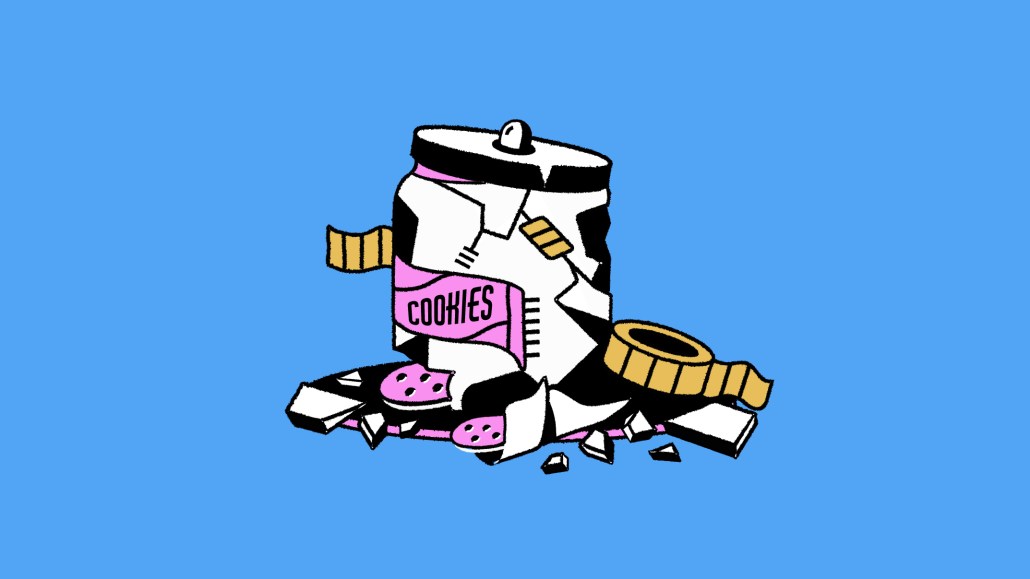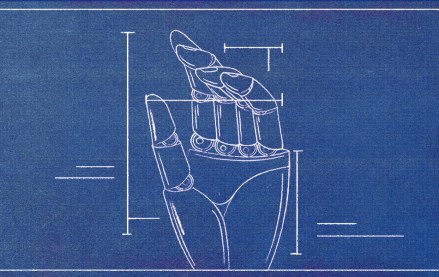Digiday+ Research: Extreme pessimism about the end of the cookie levels off among agencies

This research is based on unique data collected from our proprietary audience of publisher, agency, brand and tech insiders. It’s available to Digiday+ members. More from the series →
Interested in sharing your perspectives on the media and marketing industries? Join the Digiday research panel.
As the end of the third-party cookie truly draws nearer, the winners and losers are likely to start emerging. According to a Digiday+ Research survey of more than 50 agency professionals, agencies are still feeling out who they think those winners and losers will be, but they’re doing so with notably less pessimism than they have in the past.
Digiday’s survey found that, of the big three tech companies, agencies expect Apple to be the winner in the wake of the end of the third-party cookie. More than half of agency pros (53%) said that Apple will gain a lot or a little after the third-party cookie goes away, with 20% saying Apple will gain a lot. Meanwhile, 43% said Google will gain a lot or a little, and 32% Meta will gain.
Speaking of Meta, agency pros told Digiday that Meta will be the loser among the big three tech companies. Fifty-nine percent said Meta will lose a lot or a little from the end of the third-party cookie (27% said Meta will lose a lot). Forty-three percent of agency pros said Google will lose a lot or a little, and 17% said Apple will lose.
Interestingly, though, the biggest differences Digiday’s survey found were among the levels of pessimism agencies expressed about the end of the cookie between Q3 2022 and Q2 2023 — more specifically the drop in extreme pessimism agencies expressed last summer.
For example, 43% of agency pros told Digiday in Q3 of last year that they expected Meta to lose a lot from the end of the third-party cookie. That percentage fell to 27% in Q2 of this year. And while 26% said last summer they expected Google to lose a lot, only 16% said so in Q2 of this year. Apple saw a similar shift: 15% of agency pros told Digiday in Q3 2022 that they expected Apple to lose a lot. In Q2 2023, just 2% said so.
However, it’s also worth noting that the percentage of agency pros who said Meta will lose a little from the end of the third-party cookie jumped from 24% last summer to 32% in Q2, and the percentage who said the same about Google jumped from 19% to 27% over the same period.
And the percentage of agency pros who said Apple will gain a lot actually fell from Q3 2022 to Q2 2023, from 30% to 20%. Those who said Google will gain a lot also fell during the period from 22% to 14%, but those who said Google will gain a little rose from 15% to 29%.
Speaking more generally of the groups that will be affected by the death of the third-party cookie (rather than specific companies themselves), Digiday’s survey found that agencies don’t really see an overall winner in a cookieless world. Publishers came the closest. But even so, only 27% of agency pros said publishers will gain a lot or a little from the end of the cookie.
Who will lose is a much closer race in agencies’ opinions, it turns out. Vendors stand to lose the most, according to agencies, Digiday’s survey found, with 64% of agency pros saying vendors will lose a lot or a little from the end of the third-party cookie. But advertisers aren’t far behind, with 62% of agency pros saying this group will lose, followed closely again by publishers (61%).
Interestingly, agencies think they will lose the least (although plenty still anticipate that agencies will lose). Forty-six percent of agency pros told Digiday agencies will lose a lot or a little after the cookie goes away. (And notably only 10% of agency pros said agencies will gain a lot or a little.)
Like with the big three tech companies, Digiday’s survey found that the most interesting change over time among the groups that stand to gain and lose in the face of the death of the cookie is that agency pros backed off quite a bit from extreme pessimism since last summer among these groups, as well.
While 41% of agency pros said in Q3 2022 that they thought vendors will lose a lot from the end of the third-party cookie, that percentage fell to 26% in Q2 2023. And advertisers saw a similar drop, from 44% to 22% over the same period. The percentage of agency pros who said agencies will lose a lot fell from 35% last summer to 14% this spring.
Publishers saw a similar drop: from 44% to 36%. This group even saw the percentage of agency pros who said they will lose a little fall from Q3 last year to Q2 this year. Thirty-seven percent said publishers will lose a little last summer, compared with 25% who said so in the spring. And agencies even see publishers’ gains improving since last summer: 9% of agency pros said in Q3 2022 that publishers will gain a little in the post-cookie era, compared with 18% in Q2 2023, and zero respondents said in Q3 last year that publishers will gain a lot, compared with 9% who said so in Q2 this year.
However, while fewer agencies said these groups will “lose a lot,” there were gains in the “lose a little” category at the same time. For instance, the percentage of agency pros who said advertisers will lose a little from the end of the cookie jumped from 30% in Q3 last year to 40% in Q2 this year. And the percentage who said vendors will lose a little rose from 30% to 38% over the same period.
It’s also worth mentioning that the percentage of agency pros who expressed that they’re neutral about their own position in the whole thing rose very significantly since last summer. Twenty-four percent of agency pros said in Q3 last year that agencies will neither gain nor lose from the end of the third-party cookie. That percentage shot up to 43% in Q2 this year.
More in Marketing

Agencies create specialist units to help marketers’ solve for AI search gatekeepers
Wpromote, Kepler and Jellyfish practices aim to illuminate impact of black box LLMs’ understanding of brands search and social efforts.

What AI startup Cluely gets — and ad tech forgets — about attention
Cluely launched a narrative before it launched a tool. And somehow, it’s working.

Ad Tech Briefing: Start-ups are now table stakes for the future of ad tech
Scaled ad tech companies need to maintain relationships with startups, when the sector is experiencing ongoing disruption due to AI.







